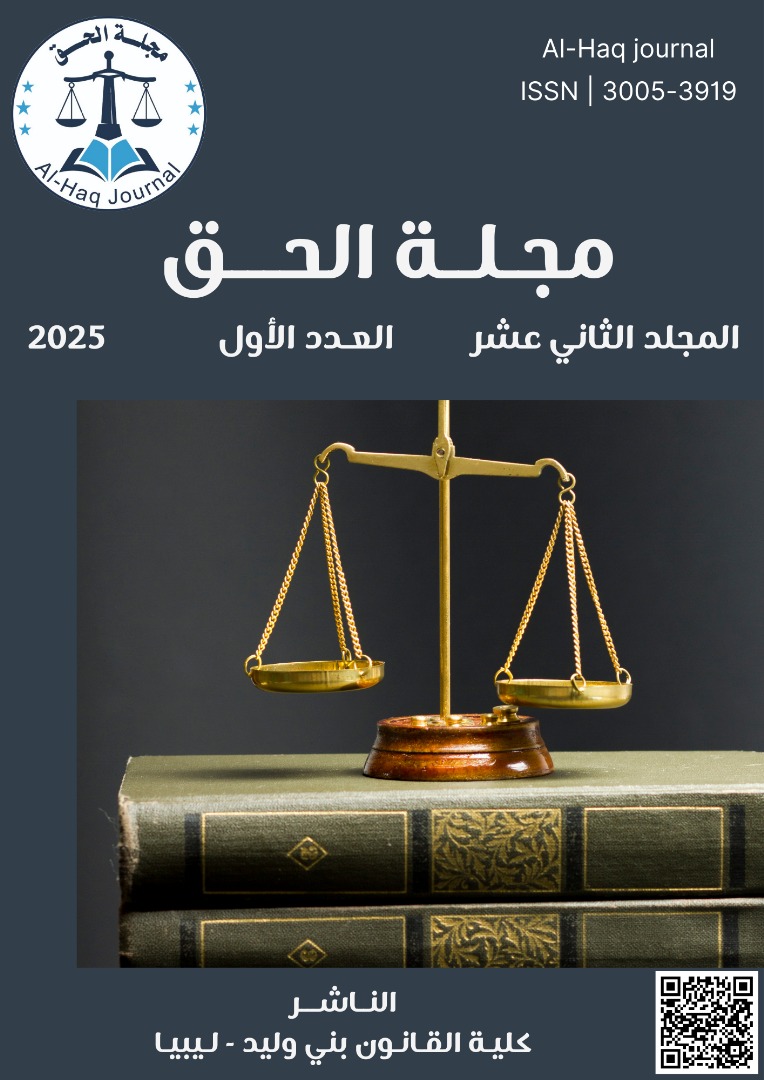The principle of non bis in idem (double indictment) at the International Criminal Court
DOI:
https://doi.org/10.58916/alhaq.v12i1.349الكلمات المفتاحية:
inadmissibility، trial، twice، act، ICCالملخص
The principle of non bis in idem, also known as the principle of "neither bis in idem" (double indictment), is a cornerstone of the international criminal justice system and ensures the protection of individuals from repeated prosecution for the same crimes. This principle is enshrined in Article 20 of the Rome Statute of the International Criminal Court, which clearly states that no person may be tried before the Court for acts that constituted the basis of crimes for which they have already been convicted or acquitted by the same court. The primary objective is to prevent undue judicial overburdening of accused persons and to maintain the stability of judicial decisions. However, this principle does not prevent the ICC from exercising its jurisdiction if the proceedings at the national level do not conform to standards of genuine justice. The Rome Statute provides exceptions that allow the Court to review cases in which national procedures have been manipulated to shield the person from international criminal responsibility, or when investigations or trials were not conducted independently or impartially, or in a manner inconsistent with the intent of bringing the person to justice. This reflects the principle of complementarity that governs the Court's relationship with national judicial systems, whereby the Court only intervenes when states are genuinely unwilling or unable to prosecute international crimes. Serious. This balance aims to ensure that perpetrators of the most serious crimes do not go unpunished, while respecting states' sovereignty and their ability to deliver justice.
التنزيلات
المراجع
Books:
• Husni, M. N. (2004). Explanation of Criminal Procedure Law. Dar Al-Nahda Al-Arabiya.
• Hassan, A. (2020). The Rome Statute: Interpretation and Commentary. Dar Al-Nahda Al-Arabiya.
• Khalil, N. (2021). Explanation of Criminal Procedure Law. Dar Al-Jami'a Al-Jadida.
• Al-Sayed, M. (2020). Principles of Criminal Justice in International Law. Dar Al-Nahda Al-Arabiya.
• Ben Ali, M. (2019). The Complementary Jurisdiction of the International Criminal Court and its Relationship with National Judiciary. Dar Al-Fikr Al-Arabi.
• Ambos, K. (2016). Treatise on International Criminal Law, Volume III: International Criminal Procedure. Oxford University Press.
Academic Articles:
• Abd Al-Ghani, M. (2022). The Principle of Ne Bis In Idem in International System and National Law. Journal of International Law, (32), 89-93.
• Al-Kubaisi, A. S. (2019). The Authority of Criminal Judgments and their Role in Preventing Repeated Trials for the Same Crime. Journal of Legal Studies, University of Baghdad, (31), 88-90.
• Ali, A. S. M., & Aqeel, H. A. A. (2025). Right to Access Company Records: Challenges and Opportunities. Al-haq Journal for Sharia and Legal Sciences, 379-394.
• Abd Al-Aziz, M. (2021). Amnesty Law and its Relationship to Transitional Justice in International Criminal Law. Journal of International Law, (42), 115-123.
• Ali, A. S. M. (2019). Provisions regulating trademarks in international agreements. Al-haq Journal for Sharia and Legal Sciences, 57-83.
• Mahmoud, H. (2022). Exceptions to the Principle of Ne Bis In Idem. Journal of International Law, Damascus University, (54), 67-69.
• Abd Al-Salam, N. (2021). The Complementary Jurisdiction of the International Criminal Court and its Relationship with National Judiciary. Journal of International Law, (45), 56-59.
International Legal Documents:
• International Criminal Court. (1998). Rome Statute of the International Criminal Court. Retrieved from https://www.icc-cpi.int/
• Office of the United Nations High Commissioner for Human Rights. (1966). International Covenant on Civil and Political Rights. Retrieved from https://www.ohchr.org/
• International Criminal Court. (1997). Reports of the Preparatory Committee for the Rome Statute. Retrieved from https://www.icc-cpi.int/resource-library/documents/prepcom_reports.pdf
Court Decisions and Official Documents:
• International Criminal Court, Pre-Trial Chamber I. (2019, April 5). Decision on "Defense of Mr. Saif Al-Islam Gaddafi's Challenge to Admissibility Pursuant to Articles 17(1)(c) and 20(3) of the Rome Statute" (Paras. 86–101). Retrieved from https://www.icc-cpi.int/libya/situation
• Office of the Prosecutor, International Criminal Court. (2022, July). Case Information Sheet – Saif Al-Islam Gaddafi. Available on the official website of the International Criminal Court: https://www.icc-cpi.int/libya/gaddafi
• Robinson, M. (2000). Statement on Amnesty and Accountability, United Nations Peace Agreement Sierra Leone. Available at: https://www.un.org/peace/sla_amnesty
National Laws:
• Libyan House of Representatives. (2015). Amnesty Law No. 6 of 2015.













